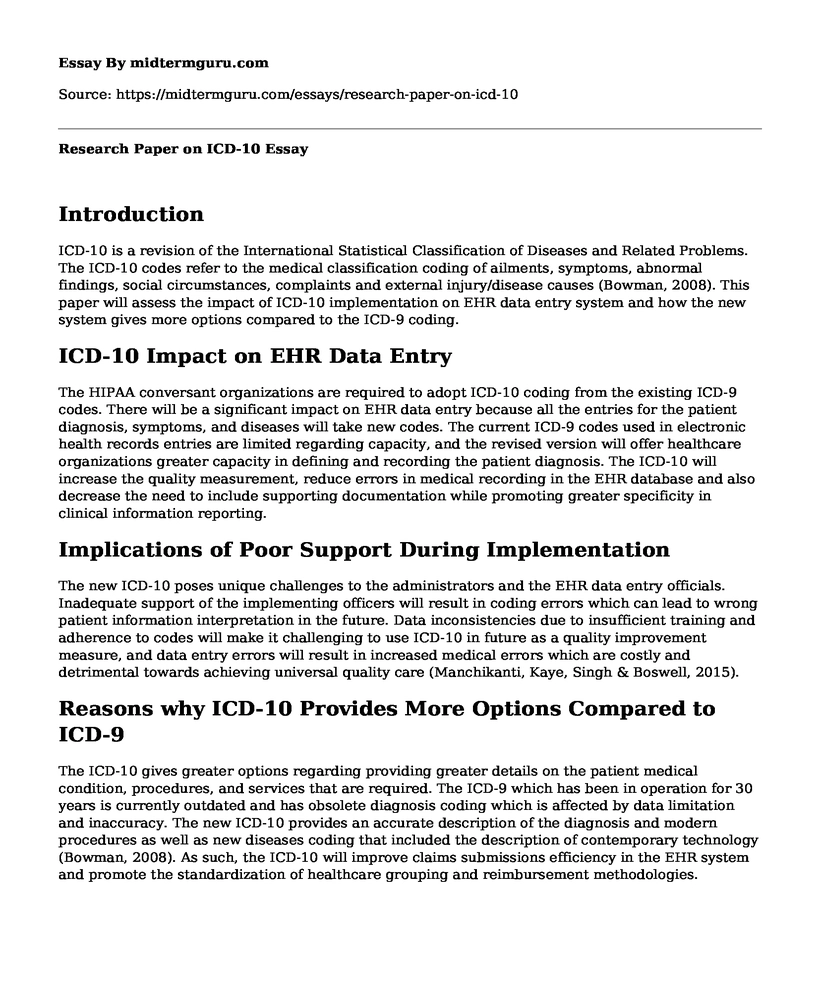Introduction
ICD-10 is a revision of the International Statistical Classification of Diseases and Related Problems. The ICD-10 codes refer to the medical classification coding of ailments, symptoms, abnormal findings, social circumstances, complaints and external injury/disease causes (Bowman, 2008). This paper will assess the impact of ICD-10 implementation on EHR data entry system and how the new system gives more options compared to the ICD-9 coding.
ICD-10 Impact on EHR Data Entry
The HIPAA conversant organizations are required to adopt ICD-10 coding from the existing ICD-9 codes. There will be a significant impact on EHR data entry because all the entries for the patient diagnosis, symptoms, and diseases will take new codes. The current ICD-9 codes used in electronic health records entries are limited regarding capacity, and the revised version will offer healthcare organizations greater capacity in defining and recording the patient diagnosis. The ICD-10 will increase the quality measurement, reduce errors in medical recording in the EHR database and also decrease the need to include supporting documentation while promoting greater specificity in clinical information reporting.
Implications of Poor Support During Implementation
The new ICD-10 poses unique challenges to the administrators and the EHR data entry officials. Inadequate support of the implementing officers will result in coding errors which can lead to wrong patient information interpretation in the future. Data inconsistencies due to insufficient training and adherence to codes will make it challenging to use ICD-10 in future as a quality improvement measure, and data entry errors will result in increased medical errors which are costly and detrimental towards achieving universal quality care (Manchikanti, Kaye, Singh & Boswell, 2015).
Reasons why ICD-10 Provides More Options Compared to ICD-9
The ICD-10 gives greater options regarding providing greater details on the patient medical condition, procedures, and services that are required. The ICD-9 which has been in operation for 30 years is currently outdated and has obsolete diagnosis coding which is affected by data limitation and inaccuracy. The new ICD-10 provides an accurate description of the diagnosis and modern procedures as well as new diseases coding that included the description of contemporary technology (Bowman, 2008). As such, the ICD-10 will improve claims submissions efficiency in the EHR system and promote the standardization of healthcare grouping and reimbursement methodologies.
References
Bowman, S. E. (2008). Why ICD-10 is worth the trouble. Journal of AHIMA, 79(3), 24-29.
Manchikanti, L., Kaye, A. D., Singh, V., & Boswell, M. V. (2015). The tragedy of the implementation of ICD-10-CM as ICD-10: Is the cart before the horse or is there a tragic paradox of misinformation and ignorance. Pain Physician, 18(4), E485-E495.
Cite this page
Research Paper on ICD-10. (2022, Aug 18). Retrieved from https://midtermguru.com/essays/research-paper-on-icd-10
If you are the original author of this essay and no longer wish to have it published on the midtermguru.com website, please click below to request its removal:
- Connecticut Emergency Alerting and Notification Systems - Paper Example
- The Oslo Study of Untreated Syphilis and Guatemala Syphilis Experiment
- Essay on Predicting Hospital Readmission Risk
- Paper Example on Injuries That Occur in a Dentist Office
- Research Paper on Oncology Patients in the ED
- Foster Care: Temporary Placement for Children Who Cannot Live With Families - Research Paper
- Nurse Leadership: Essential Competencies for Success in Healthcare - Essay Sample







